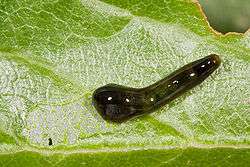Pear slug
| Pear slug | |
|---|---|
 | |
| Scientific classification | |
| Kingdom: | Animalia |
| Phylum: | Arthropoda |
| Class: | Insecta |
| Order: | Hymenoptera |
| Suborder: | Symphyta |
| Family: | Tenthredinidae |
| Genus: | Caliroa |
| Species: | C. cerasi |
| Binomial name | |
| Caliroa cerasi Linnaeus, 1758 | |
The pear slug or cherry slug is the larva of the sawfly, Caliroa cerasi, a nearly worldwide pest. They are not slugs but are a kind of sawfly of the family Tenthredinidae. The pear slug is an important pest that eats leaves of cherry, pear, and plum trees, leaving behind a skeleton of veins. The larvae cover themselves in green slime, making themselves unpalatable to predators. When the larvae are fully grown, they drop off the tree on the ground and pupate underground. The adult sawfly emerges from the pupal case and climbs from the soil to mate and lays eggs on the leaves of the host plant, completing the lifecycle.
Other sources dispute the notion that the females climb the tree to lay their eggs, claiming instead that they fly to the tree. This is an important detail in regards to their control in horticultural circumstances where glues are used to control climbing pests.
References
- http://australian-insects.com/lepidoptera/none/slug.html pictures
- http://www.entomology.ualberta.ca/searching_species_details.php?c=8&rnd=03074912&s=5438
- http://www.itis.gov/servlet/SingleRpt/SingleRpt?search_topic=TSN&search_value=152802 with classification